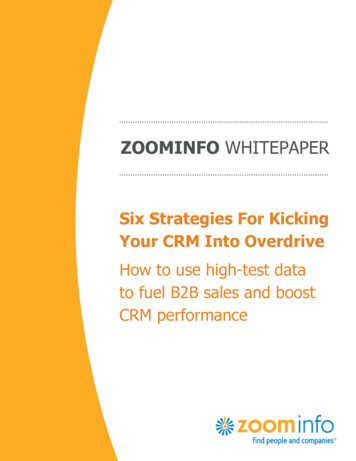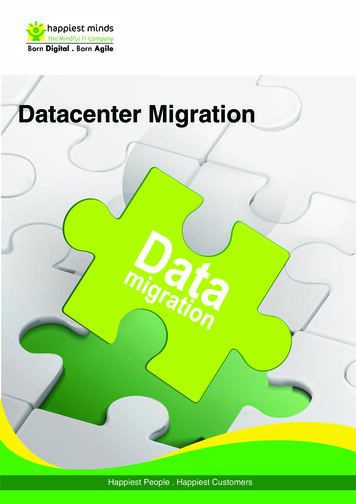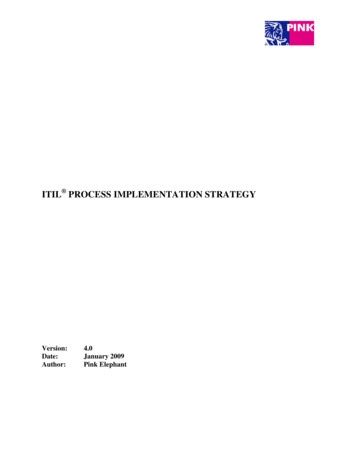
Transcription
.ZOOMINFO WHITEPAPER.Six Strategies For KickingYour CRM Into OverdriveHow to use high-test datato fuel B2B sales and boostCRM performance
Six Strategies For Kicking Your CRM Into OverdriveHow to use high-test data to fuel B2B sales and boost CRM performanceOne common denominator among both start-ups and Fortune 1000 companies is the struggle to maintain accurate,up-to-date contact information in their Sales Force Automation (SFA) systems. Early-stage organizations are stillstruggling to build a database of valid contacts within their target markets, while larger firms typically have to filterthrough a sea of older records--often cluttered with incomplete, invalid contact information--in order to coordinate anoutbound sales campaign.According to recent research from leading benchmark firm SiriusDecisions, between 10% and 25% of B2B customerand prospect records include critical data errors ranging from incorrect demographic data to a lack of currentdisposition. Those estimates are consistent with research from Marketing Sherpa, which found lead generationcontacts typically “go bad” at a rate of 2.1% per month, as executives transition to new positions and companieschange names, relocate, etc.For smaller companies still building out their prospect database, email is typically the most common communicationmedium, but it is also the most difficult database to keep current. Email service provider ExactTarget recentlycalculated average email list growth at 35-40% per year, after attrition of approximately 25%.Since the ownership and management of the contact database is often shared across a number of departments andstaffers, the inability to build and maintain an accurate and up-to-date contact database is often the biggest roadblockto companies developing successful demand generation programs. Sales reps become frustrated following up on leadsthat turn into dead ends and marketing is hesitant to invest in lead gen campaigns that result in more bounce backsthan inquiries.To overcome these inefficiencies, many B2B organizations are integrating business intelligence tools directly into theirCRM systems to enable their teams to quickly find and qualify relevant current contacts. By combining prospectintelligence with CRM applications, companies are able to search for contacts and companies from within their CRMand then merge the up-to-date records into their existing database.In the following white paper, we will highlight six strategies leading B2B organizations have implemented to improvethe results of their marketing campaigns as well as the efficiency of their sales organizations:1–CLEANING HOUSE: DE-DUPING OVERGROWN DATABASES2–FRESHENING UP: ADDING EMAIL, KEY FIELDS TO YOUR CURRENT CONTACTS3–DRILLING DEEPER: USING EXISTING BUYERS TO UNCOVER NEW PROSPECTS4–SEGMENTING CAMPAIGNS: PROFILING PROSPECT GROUPS5–MAKING SMARTER SALES CALLS: INCREASING RELEVANT OUTREACH6–REDUCING INEFFICIENCIES: CUTTING THE COSTS OF BAD DATAZoomInfo 307 Waverley Oaks Road, Waltham, MA 02452, USA Toll free: 866.904.ZOOM (9666) www.zoominfo.com
1—CLEANING HOUSE: DE-DUPING OVERGROWN DATABASESAfter a few years of going unmanaged, it is not uncommon that companies wind up with CRM systems filled withduplicate records that contain multiple variations on contact information.The database duplication process typically unfolds like this: John Smith from Acme Products registers for a webinarand uses his personal email address. He then stops by your trade show booth three months later and leaves abusiness card with a direct phone number and his business email address. Then later that same year he moves to anew division of the company and downloads a white paper using a completely different set of contact information.The amount of prospect and customer data in the average B2B organization typically doubles every 12 to 18 months,according to SiriusDecisions data. That means your database of 10,000 records will likely have 20,000 contacts nextyear and more than 30,000 a year later. While that might sound like good news, anyone who has ever beenresponsible for administering a contact database will quickly attest to the challenges that come with keeping recordsup-to-date and accurate.Many leading companies have tackled this challenge by using automated solutions to de-dupe their existing CRMdatabases. In order for this process to have maximum impact for both sales and marketing, it is critical that thisprocess not only removes duplicates but also finds and verifies the most current and accurate contact information for aprospect and provides the ability to update that record directly with the CRM system.Companies having the greatest success with this de-duping process are making this a collaborative process. Therefore,rather than a CRM administrator simply chopping off any records that look like repeats, the sales team is notified ofthe change and alerted to the updated contact information now available within the system.In their recent Research Brief titled, “The Impact of Bad Data on Demand Creation,” SiriusDecisions stressed that datacleansing should be addressed on an ongoing basis, rather than being viewed as a one-time project; “The fundamentaltrouble with one-time data cleansing is that the day the project ends, the data is the cleanest it will be until the nextround of contacts is added to the database.”2—FRESHENING UP: ADDING EMAIL, KEY FIELDS TO YOUR CURRENT CONTACTSOne of the biggest challenges for marketers in trying to align their demand generation efforts with existing prospectfiles is working with incomplete records. Marketers often inherit databases where 30% to 40% of the contacts do nothave email addresses included. This represents a significant hurdle for marketers looking to move their messagingfrom telesales to a digital dialog which can be measured and tracked.Many leading B2B organizations are addressing this challenge with the help of email append services. Informationservice providers who specialize in appending emails can quickly match a company’s database against their ownpermission-based database to produce corresponding email addresses. This simple and surprisingly affordable processcan expand the number of accurate email records in a B2B database by as much as 40%, depending on the size of theZoomInfo 307 Waverley Oaks Road, Waltham, MA 02452, USA Toll free: 866.904.ZOOM (9666) www.zoominfo.com
file. Once the master data file is updated in the CRM to include the corrected email addresses, sales and marketingteams across the organization will have access to the same fresh data.Jackie Terry, manager of marketing programs at Kronos, Inc., recently used ZoomInfo’s append service to updatecontact information for a sizable list of potential buyers. “We had a target list of more than 100,000 decision makers,but no email addresses. ZoomInfo was able to quickly fill in the blanks supplying us with tens of thousands of freshcontacts,” Terry said.Appending email addresses is an increasingly popular and proven way for marketers to boost delivery and responserates. It also helps sales reps to convert stale contacts into active leads. Providers of data services can also appendother contact valuable information including postal addresses, phone numbers, URLs, and more.3—DRILLING DEEPER: USING EXISTING BUYERS TO UNCOVER NEW PROSPECTSOnce companies are working with a de-duped database that has complete contact information, they often start touncover the real power of their existing customers and prospects. Again, by integrating intelligent database tools,many B2B companies have uncovered other prospects within the same vertical markets and quickly imported currentinformation about those companies and contacts directly into their CRM or SFA system.For example, Widen Enterprises recently accelerated its prospecting efforts in the graphic communications business byintegrating ZoomInfo’s PowerSell application into Salesforce.com. According to Widen’s VP of sales and marketingMatthew Gonnering, Widen sped up its average sales cycle from 10 months to 90 days. For example, a search formarketing managers in the hospitality industry yielded a targeted list which they imported directly into Salesforce forthe sales team. When a sale closed, they used ZoomInfo to identify a new client’s competitors as likely prospects.“Rather than risk investing money into lists that may be outdated or inaccurate, our marketing department beganbuilding prospect lists using ZoomInfo PowerSell,” Gonnering says. “By leveraging the tool directly within Salesforceand our CRM workflow, it’s easy to find key contacts and build lists of prospects. Using those contacts, our sales teamhas closed so much business that it has paid for itself.”Scott Gillum, author of the B2B Sales & Marketing Knowledge Sharing blog and an executive with the GyroHSR agency,further suggests “Try mining your existing accounts for opportunity and you might just find a goldmine in yourown back yard.”In the recent Forrester report, “How Managing Leads Pays Off In A Stronger, More Qualified Pipeline,” the first of fourKey Performance Indicators (KPIs) identified by Laura Ramos to optimize lead management was targeting. Ramosrecommends you “Learn who your best customers are, how they buy from you, and which activities or behaviorsincrease their propensity to buy. Prioritize what you learn against the new opportunities and audiences you want topursue.”ZoomInfo 307 Waverley Oaks Road, Waltham, MA 02452, USA Toll free: 866.904.ZOOM (9666) www.zoominfo.com
Brian Hession, President of Massachusetts-based list intelligence provider Oceanos, recommended this approach as akey to list success in 2010, “It starts with the identification of the target accounts and then implementing a systematicapproach for leveraging the data sources that contain the appropriate decision makers and influencers.”Leading industry analysts have pointed to the integration of prospect intelligence into traditional CRM environments asa key component of the emergence of Sales 2.0 environments. “Salespeople are looking for technologies to help themcast a broader net into a more defined or specific set of accounts or opportunities so they can do a better job to crosssell and upsell inside the existing base,” said Joe Galvin, VP at SiriusDecisions. “The balance of that demandgeneration that doesn’t come from marketing is up to them, and they need tools to help them do that.”4—SEGMENTING CAMPAIGNS: PROFILING PROSPECT GROUPSIn addition to fueling the sales prospecting process with more targeted names, many B2B marketers are seeingstronger results by focusing their marketing campaigns on more targeted prospects. These “micro campaigns” havemessaging and offers aimed at smaller groups within specific job titles or vertical markets, and have been producingmuch higher open and click-through rates.“I expect to see more focus on behavior-based segmentation in driving personalized and customized content for eachcampaign,” said Henry Bruce, President of The Rock Annand Group, a NY area consultancy. “I believe 2010 will seemarketing working even more closely with sales to define campaigns for very targeted groups of prospects. Usingmore online prospect intelligence tools such as ZoomInfo, campaigns will be executed for prospect groups of 25-50with a very specific call-to-action that sales/inside sales calls on within 48-72 hours for follow up. I have beenexecuting a number of these type campaigns over the past few months with very strong results.”In a recent example of successful profiling, SK&A Information Services, a provider of healthcare information solutionsand research, used ZoomInfo to build a database of prospects focusing on four principle healthcare industries and avariety of unique keywords submitted by the company’s VP of Marketing, Jack Schember. Based on Schember’s precisecriteria, ZoomInfo delivered a list of 20,000 prospects that included all the pertinent contact information including validemail addresses and telephone numbers.SK&A used the updated contacts to launch targeted brand awareness campaigns and reach out to previously untappedprospects. While Schember had been seeing delivery rates of only 70% with less targeted lists, he netted a 95%delivery rate with the segmented list pulled from ZoomInfo, as well as a significant uptick in open rates.5—MAKING SMARTER SALES CALLS: INCREASING RELEVANT OUTREACHSince most B2B companies have looked to reduce or maintain overhead levels during the recent economic downturn,the efficiency of their sales team is a top priority. With that in mind, many companies have looked to integrate listintelligence tools with their CRM or SFA system to arm their sales team with relevant background for their outreach.ZoomInfo 307 Waverley Oaks Road, Waltham, MA 02452, USA Toll free: 866.904.ZOOM (9666) www.zoominfo.com
By integrating list intelligence tools, sales teams not only have up-to-date contact information on targeted prospects,they can also import in-depth profiles to gain insight on prospects and build commonality faster. This “warm calling”approach provides a sales representative with background on organizations the prospect is involved with as wellschools they have attended and recent speaking engagements. Connecting the profiling tools directly to the CRM alsoallows a sales executive to save that relevant information for follow-ups and reminders.Tom Flynn, VP of marketing at Lavante, a provider of On-Demand Profit Recovery Technology, said integratingZoomInfo with Salesforce.com has made it easier to construct and implement outbound marketing campaigns. Thefact that they can now get current prospect information from a single source in real time has also made their salesorganization more efficient. “It simplifies the daily work of both inside and outside sales,” Flynn said. He added thatZoomInfo enables Lavante’s sales reps to update their CRM files on the fly, “As soon as they learn something newabout a lead, they can immediately put the information into the proper context and add strategic notes to theirpipeline.”Lavante has also used the ZoomInfo integration to connect with the right contacts in their target market—fromaccounts payable personnel up to the CFO level. The teaming of the expanded contact list with in-depth profiling, hashelped Lavante do what Flynn calls “radiating around leads” to get past gatekeepers and engage with the appropriatedecision maker. He explains, “With ZoomInfo, you can go up a level, or look laterally, or even search a level down, tofind that key person at your target organization with whom you can start a conversation.”6—REDUCING INEFFICIENCIES: CUTTING THE COSTS OF BAD DATABeyond the payoffs of more effective marketing campaigns and better results from sales prospecting, companies whohave integrated list intelligence tools into their CRM systems are improving bottom line performance by eliminating orreducing wasteful spending on “spray and pray” campaigns and cold calling.The database is typically overlooked as a strategic asset, and therefore spending time and money to update andintegrate the information is not prioritized. The SiriusDecisions “Bad Data” briefing pointed out: “The longer incorrectrecords remain in the database, the more expensive it becomes to deal with them.”SiriusDecisions estimates that organizations that have an early-phase data strategy in place can expect an estimated25% uplift in conversion rates between the inquiry and marketing-qualified lead stages. The research consultancypointed out that most companies also see improvements at later phases in the Demand Creation Waterfall model. Forexample, SiriusDecisions estimates that clean data can shave as much as 5% off a rep’s time to convert salesaccepted leads to sales-qualified leads. That’s because with clean data at his or her fingertips, the rep isn’t saddledwith the additional task of contact discovery to make a connection.Using an example of a prospect database of 100,000 names and a campaign response rate of 2%, SiriusDecisionsprojected a strong organization would realize nearly 70% more revenue than an average organization purely based ondata quality. SiriusDecisions concluded poor data quality impacts all areas of customer acquisition and management.“It isn’t just a marketing issue a best-in-class data strategy is shared by marketing and sales, and is focused onquality from cold to close.”ZoomInfo 307 Waverley Oaks Road, Waltham, MA 02452, USA Toll free: 866.904.ZOOM (9666) www.zoominfo.com
CONCLUSIONFor many BtoB organizations, the CRM system serves as the lifeblood of the company, housing critical data on existingcustomers as well as sales prospects. Unfortunately, the task of maintaining up-to-date and accurate informationwithin the CRM system is often poorly managed within companies large and small.Because both marketing and sales teams actively use the systems, there are typically too many “hands in the cookiejar” adding new records and often forgetting to update older records. The freshness and accuracy of the database isusually not a priority for companies until it is too late—usually when the performance of both sales and marketingplummets.Many progressive companies are getting a competitive edge by incorporating sophisticated list management and dataintelligence tools into their CRM. For example, more than 300 Salesforce.com users are currently using ZoomInfo’sPowerSellSF application to match target accounts, import missing contacts, merge records, and generate freshprospect lists all right from within their CRM. Likewise, users of Microsoft Dynamics, Oracle CRM On Demand andSugarCRM are also turning to ZoomInfo to find new leads and enhance the data they have for existing prospects.Data intelligence tools and append services are not only allowing companies to de-dupe and refresh their existingdatabases with accurate records, they are enabling companies to penetrate deeper within prospect organizations byidentifying other relevant executives. They are also making CRM systems smarter by adding further background andintelligence on companies and executives right into the database, which allows sales reps to quickly research theirprospects before they pick up a phone or walk into a meeting.ZoomInfo 307 Waverley Oaks Road, Waltham, MA 02452, USA Toll free: 866.904.ZOOM (9666) www.zoominfo.com
integrating ZoomInfo’s PowerSell application into Salesforce.com. According to Widen’s VP of sales and marketing Matthew Gonnering, Widen sped up its average sales cycle from 10 months to 90 days. For example, a search for marketing managers in the hospitality industry yielded a targeted list which th











